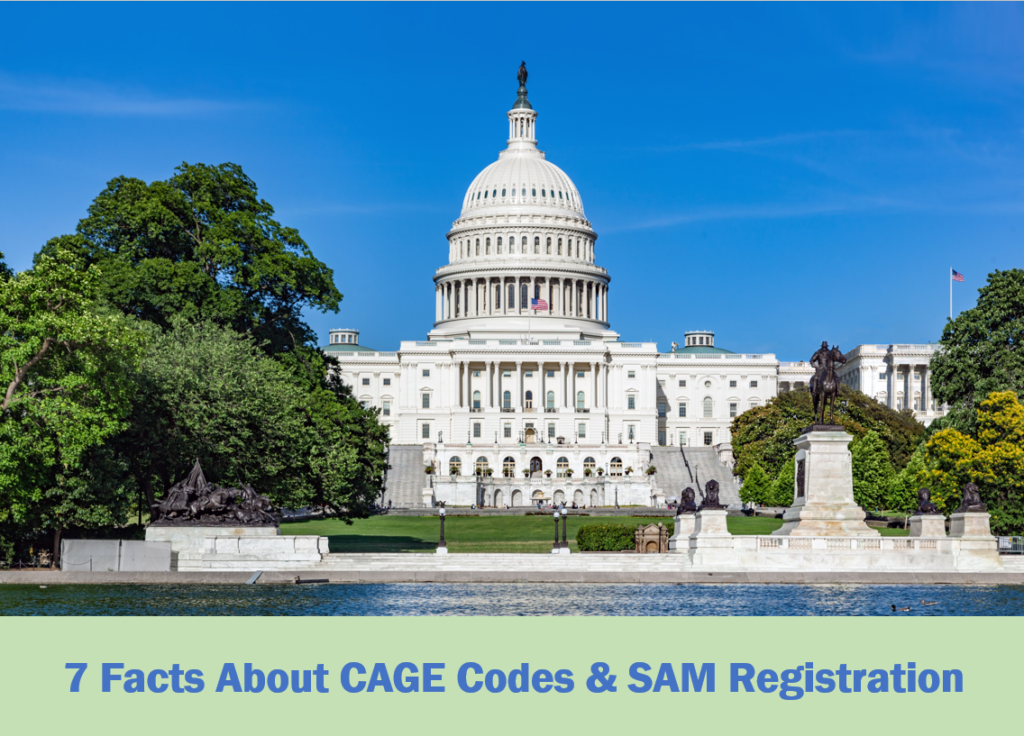When you first enter the world of government contracting, you will be hit with a barrage of unfamiliar terminology that might leave you a bit baffled. For instance, you might wonder “what is a CAGE code,” or “what is an MPIN?” Here’s a brief explanation of some of the most common terms that you might hear as well as some information about how to get your CAGE codes and MPIN.
- SAM – This is the System for Award Management, which is a federal system that consolidates several federal procurement systems and the Catalog of Federal Domestic Assistance into one new system, including the functionality from the Central Contractor Registry (CCR). You will occasionally hear someone still talk about central contractor registration, but that is no longer the correct term, instead, we call this SAM registration.
- CAGE Code – If you’ve been wondering what is a CAGE Code? This stands for Commercial and Government Entity code, and it is the unique identifier you receive once your SAM registration has been completed and approved. This important code should appear on your government capability statement as well as any bids you submit as government procurement agents will use this code to look up your company in SAM.
- MPIN – This stands for Marketing Partner Identification Number, and this is a number that you will create as a security measure to use with the System for Award Management. Unlike the CAGE code, which you will give out freely to government agents, your MPIN should never be given to anyone, as this is essentially a password.
- FAR – Federal Acquisition Regulation: The primary set of rules in the Federal Acquisition Regulation System governing the “acquisition process” through which the federal government purchases goods and services.
- RFP – Request for Proposal: A solicitation document issued by the government to prospective contractors. An RFP outlines the contracting agency’s needs and evaluation criteria for awarding a contract.
- RFQ – Request for Quotation: A solicitation typically used when requirements are not complex. An RFQ seeks a quote for the cost of meeting a specific need.
- IFB – Invitation for Bid: A formal solicitation for contractors to submit a bid to perform a specific task or project, typically used in sealed bidding procurements.
- IDIQ – Indefinite Delivery, Indefinite Quantity: A contracting method that provides for an indefinite quantity of supplies or services during a fixed period.
- GSA – General Services Administration: A federal agency that provides workspace, products, services, telecommunications, and policy solutions. The GSA offers what are known as GSA schedules or GSA contracts, and the businesses that participate essentially become approved vendors for government agencies without having to deal with the contract bidding process.
- GWAC – Governmentwide Acquisition Contract: A contract in which multiple government agencies align their needs and purchase a contract for goods or services.
- SBA – Small Business Administration: A United States government agency that provides support to entrepreneurs and small businesses. If you are a small business, we can help you sign up with SBA as part of our SAM registration services.
- 8(a) – 8(a) Business Development Program: A program administered by the SBA designed to help small, disadvantaged businesses compete in the federal marketplace. This is sometimes called 8a certification, and it can be a great way for a business owner to grow their company.
- NAICS – North American Industry Classification System: A classification system that groups businesses into industries based on the similarity of their production processes. We recommend using your NAICS codes when searching for contact opportunities at SAM.gov.
- DUNS – Data Universal Numbering System: A unique nine-character number used to identify each physical location of a business. The DUNS number was used for SAM registration but is being phased out in favor of the Unique Entity Identifier (UEI).
- UEI – Unique Entity Identifier: A new, non-proprietary identifier issued by SAM.gov to uniquely identify entities receiving federal awards, replacing the DUNS number. Anyone new to SAM must apply for a UEI number and we will help you with this as we complete your SAM registration.
- SDVOSB – Service-Disabled Veteran-Owned Small Business: A designation given to small businesses owned by service-disabled veterans to help them compete for federal contracts.
- WOSB – Women-Owned Small Business: A designation that allows women-owned small businesses to compete for federal contracts within industries where women are underrepresented.
- HUBZone – Historically Underutilized Business Zone: The HUBZone certification program helps small businesses in urban and rural communities gain preferential access to federal procurement opportunities.
- Set-Asides – These are government contracting jobs that are set aside specifically for small businesses. There are SDVOSB set-asides, WOSB set-asides, HUBZone set-asides and more.
Departmental “Nicknames”
The federal government includes more than 400 agencies and subagencies, and many of the names of these agencies are often shortened to abbreviations. Some are probably familiar, such as FEMA (the Federal Emergency Management Agency) or DOD for the Department of Defense or even HUD for the Department of Housing and Urban Development.
All of these agencies must purchase the bulk of their goods and services from the private sector, which is good news for anyone wishing to become a federal contractor. While you might have decided to become a contractor to bid on FEMA contractor jobs or disaster relief jobs, there are plenty of opportunities from other agencies.
Additionally, be sure to look beyond fed contracts. States and counties across the United States also procure goods and services from private-sector businesses, so be sure to look at your state’s procurement system for contracting opportunities.
Get Started With Government Contracting
At Federal Contractor Registry we can provide you with fast and 100% accurate SAM registration services and SAM renewal. We also will help you attain your UEI number and help you sign up with SBA and determine for what set-asides your company might be eligible.
We hope this clears up what is a CAGE code as well as some other tricky government acronyms. While the world of government contracting can seem mystifying, once you get the hang of it, this can be a great way to boost your business. If you want our team to complete your SAM registration, just click on the New Registration tab on our homepage and fill out our quick contact form.

